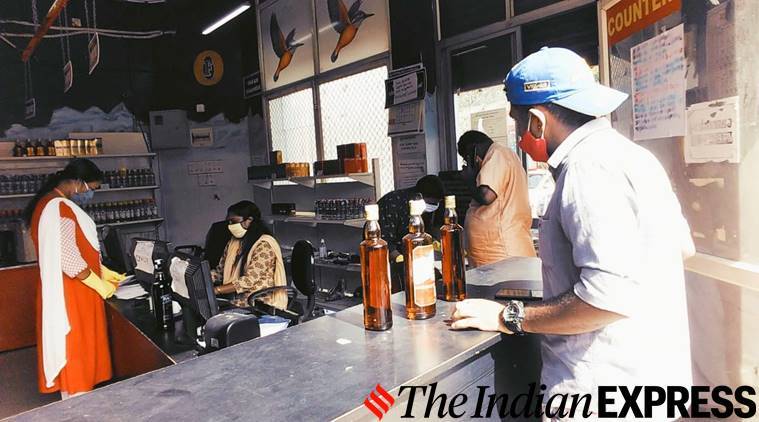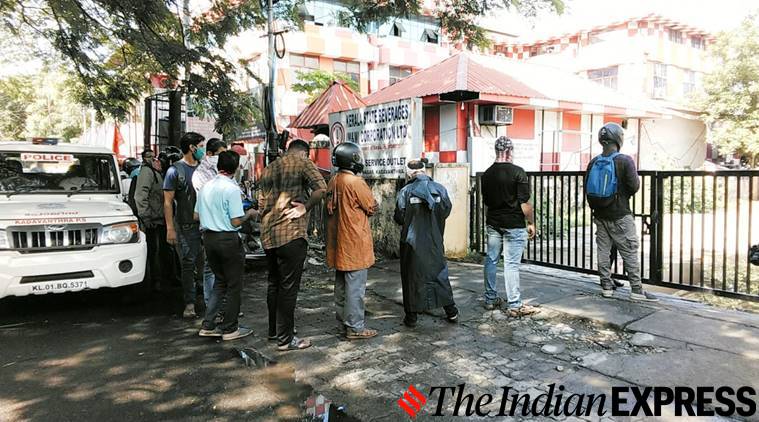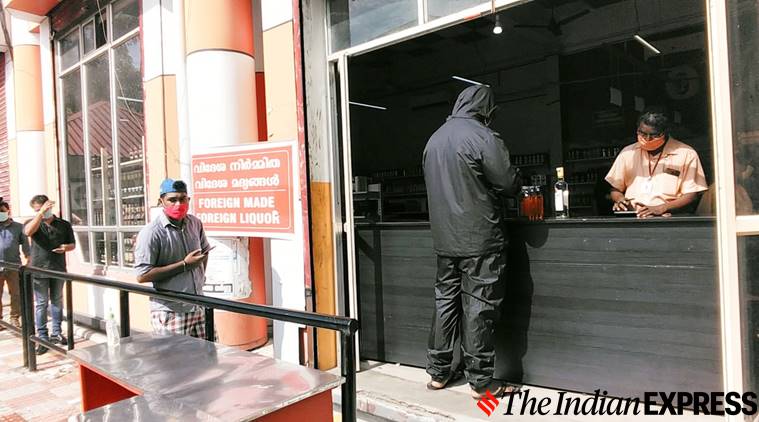 A man buying alcohol at one of the BEVCO stores in Kerala. (Express photo by Nitin RK)
A man buying alcohol at one of the BEVCO stores in Kerala. (Express photo by Nitin RK)
Ending a two-month wait for tipplers in the state, Kerala Thursday began dispensing liquor through the state-run BEVCO outlets and bar counters. But the sale of liquor is restricted to those who place orders in advance through a newly-launched mobile application named BevQ.
For those without smartphones, SMS’es can be sent to a specified number in response to which virtual token numbers will be issued with details of the liquor store and the time at which the customer needs to arrive. The Kerala government devised the virtual queue system as a way of selling liquor after it saw the massive crowds that emerged when liquor shops re-opened in other states.
The BevQ app, developed by a local startup Faircode Technologies, was launched on the Google PlayStore late Wednesday night and was downloaded by more than 1 lakh users in under 12 hours, indicating the massive interest among the population in purchasing liquor after two months of lockdown. Upon opening the app, users are taken to a basic sign-in page where they are required to register using their name, contact number and pin-code. The details are verified using an OTP sent to the user’s mobile number.
 People queue outside a liquor store two months after shops reopened on Thursday. (Express photo by Nitin RK)
People queue outside a liquor store two months after shops reopened on Thursday. (Express photo by Nitin RK)
Once the registration process is completed, users can choose to place their orders, depending on the brand and type of liquor they consume, and buy tokens. The tokens, in the form of a QR code, will have details of the liquor outlet they need to visit and the time of purchase. Payment can be made directly at the counter. While bookings can be made between 6 am and 10 pm, the liquor stores will operate between 9 am and 5 pm, with Sundays and other dry days closed.
But within hours of the app’s launch, a lot of users have reported glitches such as not receiving the OTP on their phones or being simply unable to make their bookings. Others reported they are not able to get their choice of liquor at nearby outlets within their area pincodes. These glitches have raised questions about the efficacy of the app, especially in handling such a massive user base whose numbers are only expected to swell in the next few days.
 Customers wear masks while they wait in queue outside a liquor store. (Express photo by Nitin RK)
Customers wear masks while they wait in queue outside a liquor store. (Express photo by Nitin RK)
For the government too, this is a concern as it depends heavily on the revenue generated from the sale of liquor to shore up its flagging finances. Earlier this month, it had jacked up prices of beer, wine and liquor by 10-35% to offset its losses in the other sectors. Already, the excise duty it imposes on liquor is among the highest in the country. In 2018-19, Kerala’s state-run liquor outlets had reported sales of Rs 14,502 crores, with an average of Rs 1200 crores purely from sales every month.
To prevent crowds from forming in front of outlets, bars and beer parlours, the excise department has mandated a maximum of five people in a queue at a time. Masks are mandatory. Employees are required to use masks, gloves and sanitisers inside the outlets. While a person can buy a maximum of three litres of alcohol on a single booking, purchases can be made only once in four days.